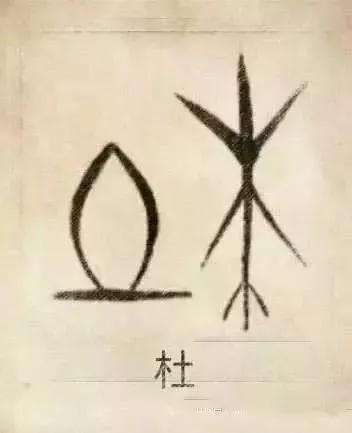The Du (dù)surname is one of the most ancient and culturally rich surnames in China. Its origins can be traced back to the early days of Chinese civilization, blending totem worship, feudal naming, and official titles into a unique cultural heritage. For friends readers interested in Chinese history and culture, the story of the Du surname offers a fascinating glimpse into the evolution of Chinese society and the enduring legacy of its people.

Ⅰ、Origins of the Du Surname
1. Take the country as the surname
Legend has it that a branch of the Shennong clan, an ancient Chinese tribe, worshipped the Du pear tree as their totem. They later established a city called Du and founded the Du State. Their descendants adopted "Du" as their surname to honor their ancestral land.
2. Descendants of Royalty
Another origin story ties the Du surname to the royal family of the Zhou Dynasty. After King Cheng of Zhou conquered the Tang State, he relocated its people to Du City (near modern-day Xi'an). Their descendants took "Du" as their surname, with Du Bo, a high-ranking official of the Western Zhou Dynasty, recognized as the founding ancestor.
3. Official Titles and Ethnic Integration
During the Spring and Autumn Period, a minister named Du Kuai served as a ceremonial officer in the Jin State. His descendants adopted "Du" as their surname. Additionally, during the Northern and Southern Dynasties, the Xianbei ethnic group adopted the surname Du as part of their integration into Han Chinese culture.
4. Mythological Connections
In Chinese folklore, Du Kang, the legendary inventor of wine during the reign of the Yellow Emperor, is sometimes regarded as an early ancestor of the Du family. If this legend holds true, the Du surname could date back over 4,000 years.
Ⅱ、Historical Figures:
1. Eastern Han Dynasty Statesmen
Du Lin: A renowned scholar and official during the reign of Emperor Guangwu, Du Lin was known as the "Master of Philology" for his contributions to the study of ancient texts.
Du Mi: A model of integrity and justice, Du Mi's legacy lives on in the Chinese idiom "as silent as a cicada in winter", which describes someone who remains silent out of fear.
Du Shi: An innovative engineer who invented the water-powered blast furnace (水排) over 1,100 years before similar technology appeared in Europe, earning him the title "Father of Chinese Machinery."
2. Literary Giants of the Tang Dynasty
Du Fu: Revered as the "Poet Sage," Du Fu's works, such as "The Three Officials" and "The Three Partings," are celebrated for their poignant portrayal of the hardships of his time. His poetry remains a cornerstone of Chinese literature.
Du Mu: A prominent poet and essayist of the late Tang Dynasty, Du Mu is best known for his essay "The Epang Palace," a critique of excess and corruption. Together, Du Fu and Du Mu are often referred to as the "Greater and Lesser Du."
3. The Legend of King Du Yu
Du Yu:also known as King Wang of the ancient Shu Kingdom, is a legendary figure in Chinese folklore. After his death, he is said to have transformed into a cuckoo bird, whose mournful cries symbolize loyalty and sorrow. This tale has become an enduring symbol in Chinese culture.
Ⅲ、Cultural Significance:
1.Ancestral Halls and Clan Names
The Du family is associated with prominent regional origins, such as Jingzhao (near Xi'an) and Xiangyang (in Hubei). Their ancestral halls often bear names like "Poet Sage Hall" in honor of Du Fu or "Jingzhao Hall", highlighting their historical roots.
2.Family Values and Teachings
The Du family emphasizes virtues such as kindness, diligence, and integrity. For example, the Du Canfang family of the Qing Dynasty upheld the motto "Virtue, Wisdom, Loyalty, and Sincerity," inspiring future generations to strive for excellence.
Ⅳ、Social Impact:
1. Population and Distribution
Today, there are approximately 5.2 million people with the Du surname. They are primarily concentrated in Hebei, Henan, Liaoning, and Hubei provinces.
2.Migration and Overseas Communities
During the late Ming Dynasty, members of the Du family began migrating to Taiwan, with larger waves of migration occurring during the Qing Dynasty. Today, many Du descendants live in Taipei and Miaoli.
In Southeast Asia, the Du family has established communities in Vietnam, Thailand, and beyond, tracing their roots back to migrations from Yunnan and Guangxi.
3.Modern Contributions
The Du family continues to make significant contributions in fields such as literature, art, and politics. For instance, the contemporary composer Du Xingcheng has organized the "Du Family Spring Festival Gala" to celebrate and preserve family traditions.
Conclusion
The history of the Du family is a testament to the resilience and adaptability of Chinese culture. From ancient totems to the timeless poetry of Du Fu, from ancestral halls to modern-day achievements, the Du surname embodies the rich tapestry of Chinese history. For those interested in exploring the roots of Chinese civilization, the story of the Du family offers a compelling narrative of heritage, values, and enduring legacy.